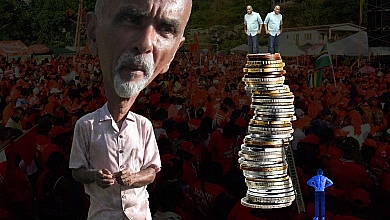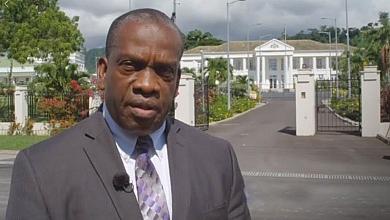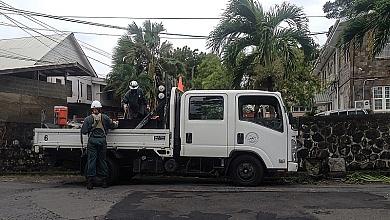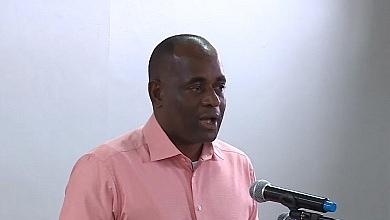UWP Unveils 10-Pillar Plan to Rebuild Dominica and Restore Shared Prosperity

The United Workers’ Party (UWP) Team Dominica held its first official press conference under Dr. Thomson Fontaine‘s leadership, unveiling a sweeping vision titled “Shared Prosperity for All Dominicans.” With a renewed executive and a detailed development agenda, the party emphasised its readiness to govern and restore opportunity, equity, and stability across the island.
The event opened with Ernie Jno. Finn’s invocation, asking for divine guidance and wisdom over the party’s direction and national leadership. Deputy President Ronald Charles welcomed media members and reaffirmed UWP’s transparency and public engagement values. “We know we love the greatest party,” he remarked, calling for accountability in contrast to what he described as the ruling party’s reluctance to face scrutiny.
Deputy Political Leader Hector “Spags” John highlighted his commitment to teamwork and national service. “I bring some experience, stability, loyalty, and teamwork in my capacity as your deputy political leader,” he stated. Emphasizing unity, he added, “All is not lost, but we have to work together as a people… Dominica is ours to build.”
Political Leader Dr. Thompson Fontaine delivered a powerful and wide-ranging address, condemning what he called two decades of mismanagement, economic stagnation, and growing inequality under the Dominica Labour Party. “The day of shared prosperity is dawning,” Fontaine declared. He emphasized that the UWP team is “competent enough with diverse backgrounds to carry us through” and committed to “resuscitate this economy.”
Fontaine outlined a 10-pillar national roadmap, with goals, including:
- Raising the minimum wage to $12/hour and boosting public service salaries
- Reforming the tax system to ease burdens on working-class families and entrepreneurs
- Modernizing healthcare with national health insurance and skilled local personnel
- Overhauling education to align with global standards and emerging industries
- Reviving agriculture and manufacturing, with renewed focus on agro-processing, fishing, and water exports
- Investing in youth innovation and skills training through a transformed National Employment Program
- Upgrading infrastructure and public services across rural and urban areas
- Leveraging renewable energy to attract investment and lower electricity costs
- Ensuring social equity through unbiased welfare systems
- Enforcing transparent governance and rooting out corruption
On the Citizenship by Investment program, Fontaine stated that Dominica must prepare for a future without it. “We will have no need for a CBI program,” he said, pointing instead to agriculture, tourism, and manufacturing as sustainable alternatives.
He also addressed concerns over the NEP, promising not to dismantle the program but to transform it into a tool for youth development. “We are in the business of creating wealth,” he said, “not maintaining poverty.”
General Secretary Nicholas George closed the conference by affirming, “The United Workers’ Party is advancing and doing the right thing.” The party will begin a series of town halls this week in the Roseau North Constituency to continue spreading its message of national renewal.
This article is copyright © 2025 DOM767








“Overhauling education to align with global standards and emerging industries”
Can Dominica’s Education System Truly Align with Global Standards?
The promise to “overhaul education to align with global standards and emerging industries” sounds visionary and progressive, but the real challenge lies in how this will be achieved, especially in a resource limited country like Dominica. Without a clear, detailed roadmap, such a pledge risks being just another campaign slogan rather than a deliverable policy.
To begin with, aligning with global standards means more than just updating textbooks or introducing digital devices into classrooms. It requires a complete restructuring of the curriculum, teacher training, facilities, and assessment systems. For Dominica to match international benchmarks in science, technology, engineering, and math it would need to invest heavily in labs, modern equipment, and skilled educators who are both trained and up to -date with global trends. Where is the funding coming from for this kind of reform?
Next, “emerging industries” like artificial intelligence, renewable energy, coding, and biotechnology demand technical infrastructure and specialized instruction, neither of which currently exists at scale in Dominica. The island’s education system already struggles with basic resource shortages, underpaid teachers, overcrowded classrooms, outdated materials, and buildings still damaged from past hurricanes.
To introduce advanced, industry specific programs in this environment requires millions in investment and years of capacity building. Has the UWP explained where they will get the funding, who will train the teachers, or what industries are being prioritized?
Furthermore, global education standards also involve access and equity. Rural students in Dominica often lack reliable electricity or internet, making it nearly impossible to implement modern e-learning platforms or access international learning resources. Overhauling the system would also require closing this digital divide, which again demands infrastructure development that is not currently budgeted for.
There is also the issue of relevance, aligning with global standards is useful only if it also prepares students for real, local opportunities. Without strong job markets in tech, clean energy, or other global sectors within Dominica itself, students might graduate with modern skills but no local job prospects, leading to an increased brain drain as young people leave the island in search of better opportunities abroad.
While overhauling the education system to meet global standards and cater to emerging industries is a noble and necessary ambition, the United Workers’ Party has yet to present a credible and detailed plan on how it will fund, execute, and sustain such a transformation. Without a clear path forward, this promise risks being more aspirational than achievable.
‘Reviving agriculture and manufacturing, with renewed focus on agro-processing, fishing, and water exports”
There needs to be a clear and comprehensive plan presented before the upcoming elections that addresses the revival of Dominica’s agriculture and manufacturing sectors. This plan should focus on developing agro-processing industries, expanding sustainable fishing, and capitalizing on the abundant freshwater resources for water exports. Without such a plan, the country risks continuing on a path of economic dependency and missed opportunities for sustainable growth.
A well-defined strategy must demonstrate a commitment to creating jobs, empowering local farmers and fishermen, and building resilient supply chains. It would also signal serious leadership willing to break away from short-term fixes and instead invest in the long-term economic independence of Dominica. Presenting this plan ahead of the elections would allow voters to hold candidates accountable and choose leadership that prioritizes sustainable development and the revitalization of key economic sectors.
Ultimately, the people of Dominica deserve transparency and a vision for how their natural resources and human capital can be leveraged to create a prosperous future. Without a clear roadmap addressing these critical areas, election promises risk being empty rhetoric rather than actionable commitments.
‘Upgrading infrastructure and public services across rural and urban areas’
Upgrading infrastructure and public services across rural and urban areas is undeniably important, but where exactly will the funding come from? The government talks about reforming the tax system to ease burdens on working-class families and entrepreneurs, yet these two goals seem fundamentally at odds. How can taxes be lowered or eased while still raising the significant funds needed for major infrastructure projects?
There is a clear lack of a credible, detailed plan explaining how these competing priorities will be balanced. Without transparency about new revenue sources or cuts elsewhere, this feels more like political rhetoric than a realistic strategy. The risk is that essential upgrades will be underfunded or delayed, and promises to support families and small businesses will fall flat.
Is this truly a commitment to meaningful change, or just another vague promise designed to appeal to voters without a solid foundation? The government must be held accountable to present a concrete, viable plan, because talk of tax relief and infrastructure upgrades without clear funding sources raises serious doubts about the seriousness and feasibility of their efforts.
“Leveraging renewable energy to attract investment and lower electricity costs”
Leveraging renewable energy to attract investment and lower electricity costs is an exciting and forward thinking goal for Dominica, especially given the island’s abundant natural resources like geothermal, solar, and wind power. However, while the vision is promising, turning it into reality involves several significant challenges.
First, developing renewable energy infrastructure requires substantial upfront investment. Building geothermal plants, solar farms, or wind turbines involves high capital costs, technical expertise, and long project timelines. Dominica’s government will need access to significant funding, likely through international loans, grants, or private investors, all of which come with their complexities and conditions.
Second, the island’s small market size limits economies of scale, which can make renewable projects less attractive to big investors compared to larger countries. Ensuring that these investments are financially viable and can offer competitive returns is a delicate balance.
Third, integrating renewable energy into the existing power grid requires modernizing infrastructure to handle variable power sources and maintain reliability. Without upgrades to the grid and energy storage solutions, reliance on renewables would lead to instability in the electricity supply.
And finally, In Venezuela, we have seen a clear example of how natural resource wealth in their case, oil, became concentrated in the hands of a corrupt political elite, while the majority of citizens fell deeper into poverty. Billions of dollars flowed into the country, but instead of being invested in healthcare, education, infrastructure, or job creation, the money was hoarded by government insiders, wasted on failed projects, or siphoned off through corruption. The result? A nation rich in resources, but poor in opportunity, with widespread hunger, collapsing public services, and mass emigration.
That same pattern is entirely possible in Dominica, especially under a government like Roosevelt Skerrit’s, which already shows signs of centralized power, lack of transparency, and questionable spending. We have already seen how the Citizenship by Investment program has brought in hundreds of millions of dollars, yet many Dominicans still face high unemployment, poor healthcare, unreliable electricity, and limited access to basic services. People are asking, Where is the money going?
Dominica could easily slide into the same trap as Venezuela where foreign investment flows in, flashy press releases are issued, but the actual benefits never reach the average citizen. Instead, we may see a few government connected individuals and companies grow wealthier, while everyday Dominicans struggle under the same high cost of living, unemployment, and underdevelopment
.
So, yes, turning Dominica’s renewable energy potential into a national success requires more than just good ideas. It demands honest leadership, public accountability, and a government that puts people before profit. Without that, the future could look a lot more like Venezuela than the “shared prosperity” that is being promised.
|Enforcing Transparent Governance and Rooting Out Corruption”
This is a hard pill to swallow! The United Workers’ Party claims that under its new leadership it will enforce transparent governance and root out corruption. On paper, this sounds like a much-needed shift for Dominica. But for many Dominicans, especially those who remember the UWP’s past before Roosevelt Skerrit, this promise is a hard pill to swallow.
The UWP was once beileved to be the “farmers dream party,” and under Edison James it rose to power on promises of economic empowerment and rural development. But that dream quickly faded. The banana industry, a backbone of Dominica’s economy died under international trade pressure and EU policy changes. Many farmers blamed the government for not protecting their interests or diversifying quickly enough
The party was marred by allegations of corruption, mismanagement, and actions driven by personal gain. It was not long before the very leaders who claimed to stand for integrity were embroiled in scandals from questionable business deals to unethical financial practices.
Eventually, the public lost trust. The same party that championed farmers and development was voted out, not because of media bias or external interference, but because its own behavior contradicted its message.
Even after losing power, several UWP members have faced criminal charges or arrests, adding to the perception that the party talks reform but fails to live by it.
So now, under Thomson Fontaine, the UWP is asking Dominicans to believe it has changed, that it will be the party to clean up government, enforce transparency, and fight corruption. That may be true in theory, but history says otherwise, and many voters have not forgotten.
If Thomson Fontaine, the UWP want to be taken seriously on this issue, it needs more than just rhetoric. It needs to:
– Acknowledge its past failings publicly.
– Show concrete internal reforms within the party.
– Present detailed anti-corruption policies, including independent watchdog bodies, freedom of information laws, and mandatory public audits.
Without that, it is hard not to see this promise as just another recycled talking point, meant to win votes rather than build a new political culture.
Dominicans have heard these lines before, and lived through the consequences.